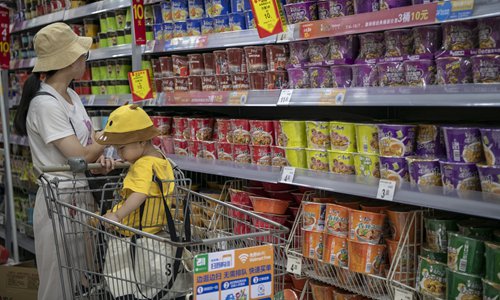Update: S.Korean instant noodle brand Samyang explains differing sell-by dates in domestic and overseas markets

A mother is purchasing packets of instant noodles at a supermarket with her son. Photo: IC
South Korean instant noodle brand Samyang Foods explained differing sell-by dates in domestic and overseas markets on Friday, citing long-time international export processes, after its products sparked concerns among Chinese consumers for playing "double standards."
Samyang Foods President Kim Jung-soo, during a meeting with the Chinese Ambassador to South Korea Xing Haiming, said that the shelf life of instant noodles exported to China, Japan, the US, Europe, Southeast Asia and other countries and regions is 12 months, compared with six months in South Korea.
"Export products need to go through long-distance transportation, quarantine requirements, customs clearance and other processes, which require a long circulation time. Instant noodles are made in South Korea," said Kim, according to a release posted on the WeChat account of the Chinese Embassy in South Korea.
Kim also explained that in order to ensure the shelf life, the enterprise adds antioxidant ingredients in the exported instant noodles in accordance with the food safety standards of the importing countries.
"There is no problem in the quality and safety of the products," Kim noted.
The expiration date on some noodle products from South Korean brand Samyang including the well-known Buldak hot chicken flavor ramen is only six-month in Korean market, compared with a 12-month length on noodles sold in Chinese and Western markets, sparkling concerns among Chinese consumers for obviously playing "double standards."
Samyang responded to CCTV on Monday that the instant noodles produced by the company are manufactured locally in South Korea and have received international food safety certification, CCTV reported on Tuesday.
The response stated that considering the long process from production to consumers worldwide, which includes transportation, disinfection and customs clearance in the target country or region, the company applies standards for export products with extended expiration date to not only include China, but also to other countries and regions with the same one-year length.
The hashtag "the expiration date of the spicy chicken flavor ramen in South Korea only half the time in China" started trending on Weibo on Saturday as Chinese netizens accused the brand of having "double standards," following the expiration dates of the popular spicy noodles being different in South Korea and China.
The Global Times found that the expiration length for some noodle products from Samyang are listed as being 12 months on the Chinese and English version of its official website, whereas the length for the same products is labeled only six months on its Korean website.
Analysts claim that the difference is of "double standard," noting that although the expiration length for some instant noodles are 12 months in China, the texture and the taste might be affected by the time differences with potential safety hazards.
Even though the noodles may be produced with a 12-month expiration standard, the best storage capacity for the noodles may only last six months, Zhu Danpeng, a veteran food industry observer told the Global Times on Sunday.
According to CCTV, the company added antioxidant ingredients for export products during the production process to extend product shelf life , while domestic products without them as products in South Korea circulate faster.
The company exported most of its products to China, Japan and the US. The sales of Buldak hot chicken flavor ramen in China accounts for more than 40 percent of its total overseas sales.
A customer service representative from Samyang's official store on Taobao.com said that the spicy chicken ramen is manufactured in South Korea and the shop is authorized by the brand, adding the manufacturers design and print the packaging in Chinese in accordance with Chinese regulatory requirements, but all of the products are produced in an overseas facility.
The local market regulator in Ningbo city, East China's Zhejiang Province, said on Sunday that responsible authorities will investigate the issue, as the Buldak hot chicken flavor ramen sold in China is operated by Ningbo NingShing Ubay international trade Corp.
Customer services representatives from another Chinese brand said that the expiration length for their products is 180 days.
"There are so many noodle varieties in China, who would eat noodles from South Korea?" a Chinese netizen commented on Weibo.
The company said it will continue to make efforts to optimize its products and comply with relevant national laws and regulations in the future.

